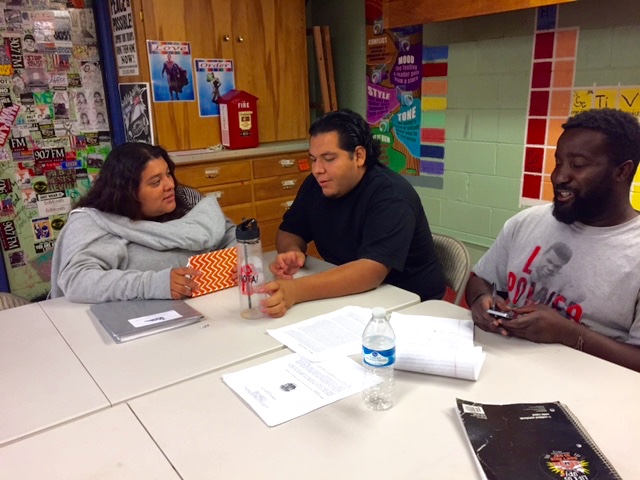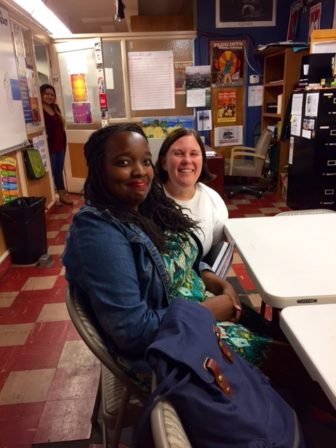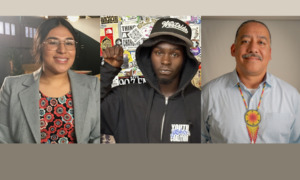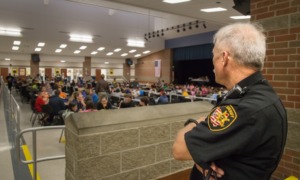
Linda Jacobson
(Left to right) Youth Justice Coalition organizers Jocelyn Mateo, Juan Peña and Diwaine Smith talk in the organization’s meeting room in Inglewood, California.
SchoolsNotPrisons, an 11-stop music and arts tour focused on both increasing spending for education and breaking the school-to-prison pipeline in California, wraps up in Stockton, California, on Friday.
But the events, which have drawn roughly 5,000 to 6,000 attendees overall since they began Aug. 6, were also a vehicle for elevating the ongoing work of local organizations in the state that advocate against harsh punishment in schools and the disproportionate incarceration of young people of color.
“What we have tried to do is shine the light on what is already going on,” said Mary Lou Fulton, the director of the Healthy California initiative at The California Endowment (TCE). “Almost all of the organizations are our grantees. We will continue to support them in doing this work.”
At the Youth Justice Coalition (YJC) in Inglewood, California, for example, that work includes writing legislation — such as the bill signed by Gov. Jerry Brown in September allowing individuals to be notified, and to appeal, if they have been added to the state’s gang database.
That work also includes convincing the Los Angeles County Board of Supervisors to back off from its $2.1 billion plan to construct two new prisons.
“I felt like the tour itself was radical for The California Endowment,” said Diwaine Smith, a member of YJC who was added to the database at age 11. “I felt like it was pushing our narrative” of the issues to focus on.
In Fresno, one of the important issues is to urge the Fresno Unified School District to stop using flexible funding from the state for school resource officers and instead expand restorative justice throughout its schools. Californians for Justice (CFJ) used the Sept. 24 concert at Fresno City College to draw attention to its efforts on this.
They gathered signatures on a petition asking the Fresno school district to remove education code violations from the records of students who go through the restorative justice process, add counselors and make other changes that help create more “relationship-centered schools.”
“Every single student should know that this is something that exists and is a resource that they can go to when they have a conflict,” said Grisanti Valencia, a lead organizer with CFJ.

Linda Jacobson
Tauheedah Shakur (left) and Kim McGill of the Youth Justice Coalition, which arranged to have voter registration tables outside their community center during the concert stop in Inglewood.
SchoolsNotPrisons, which got its name from an already trending hashtag, was inspired by a listening tour TCE began conducting in 2010 about building healthier communities.
“One thing we hadn’t understood was the impact of punishment and incarceration on the health of low-income communities,” Fulton said. “We turned our attention to what we can do as a foundation to raise awareness about these issues.”
She pointed to recently released data from Million Dollar Hoods, a research project based at the University of California, Los Angeles: It found that nonviolent offenses — DUI and drug possession — are the top two causes of arrests in the communities where the LA Police Department spends the most money on incarceration.
Recent Field Poll results, she added, show that two-thirds of voters say they want their local governments to increase spending on mental health services, job training and more support programs for youth. “We need to get our budgets aligned with our values,” she said.
While voting has been encouraged as part of the tour, Fulton said she doesn’t know how many new voters have registered as a result of the campaign. The foundation isn’t lobbying for particular pieces of legislation, she said.
YJC did negotiate to have voter registration tables outside their community center and to allow speakers to discuss specific causes, said Kim McGill, a YJC organizer.
“We wanted it to be music and art, but also message,” McGill said, adding that she hopes the foundation will “lead by example” by hiring formerly incarcerated people and inspiring other philanthropies to fund similar work.
In San Bernardino, Congregations Organized for Prophetic Engagement (COPE), a faith-based organization, registered almost 2,000 people to vote in the days surrounding the Aug. 27 concert.
“The tour was not only to highlight this issue, but to activate this young voting bloc,” said the Rev. Samuel Casey, COPE’s executive director. The event also helped launch a countywide task force that focuses on changing school discipline policies “from a culture of punishment to a culture that give students an opportunity to be successful,” he said.
Many of the tour stops were held in places that have the types of community-based youth programs the organizers view as models. The Oxnard Police Activities League (PAL) Teen Center, for example, offers free sports and enrichment programs, mentoring and tutoring. “Here’s a physical example of a building in a community that is safe and a fun place for people to come,” Fulton said.
Before each concert, the foundation and Revolve Impact, a Los Angeles-based agency that co-produced the tour, held a youth artists’ roundtable — a chance for the prominent rap, R&B and other performers to meet face-to-face with teenage and young adult attendees.
Fresno High School junior Destiny Harris, who is helping organize a CFJ club at her school, described the conversation as a “really open space” in which the students and artists shared stories about their school experiences. The concert was an effective way to focus community members on the issue, she said.
“It lets people know we’re really serious about the problem,” Harris said, “and we’re not just doing this to pass time.”
John Forte, a Grammy-nominated rap and R&B singer and songwriter who attended three of the concerts, says he is “indelibly attached” to the SchoolsNotPrisons cause and has even added the hashtag to a video project he currently has in the works.
“I don’t think I have a choice,” he said, “but to have this work be part of my work.”
The California Endowment funds coverage in California for Youth Today and the Juvenile Justice Information Exchange.
This story has been updated.






























